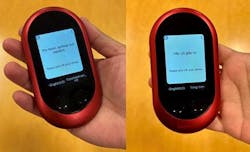TSA testing language translation-interpretation tech
WASHINGTON - The Transportation Security Administration (TSA) announced its officers are testing the use of new hand-held language translation-interpretation devices to support a more positive security checkpoint experience for individuals who are limited English proficient, international travelers and individuals who are deaf or hard of hearing or who are blind or have low vision.
These devices, smaller than mobile phones, are equipped with a library of 83 languages. TSA officers or travelers can speak into the device, which will then translate the message into the selected language. The translated message is repeated audibly for the traveler and displayed on-screen for those who are deaf or hard of hearing.
Five units have been deployed at checkpoints in Philadelphia International Airport's terminals A-East, A-West, B, and DE. These units, powered by rechargeable batteries and capable of connecting via Wi-Fi or data, offer flexibility in deployment without needing to be tethered to electrical outlets.
Related: Self-service TSA screening is being tested in Las Vegas. Here's how it works
In the initial period of use, TSA has observed benefits from the devices but also encountered challenges such as difficulties in accurately translating certain terms, like "pat-down," across all languages. The devices can store up to 10,000 commonly used translations and receive software updates to expand language options and vocabulary.
“The field testing of these units is one step that we are taking to improve our communication with a broader traveling population and further enhance the customer experience,” explained Jose Bonilla, TSA’s Executive Director of the agency’s Traveler Engagement Division. “The results of this field test will allow us to evaluate the viability of a small, stand-alone communication device at our checkpoints by assessing the ease and effectiveness of use and its impact on checkpoint operations.”
To address the noise levels at checkpoints, TSA officials emphasize the importance of clear enunciation when using the devices to avoid translation errors. Gathering such information is crucial for addressing ambient noise challenges effectively.
Related: TSA issues new cyber security requirements for airport and aircraft operators
“We hope that this will turn out to be a valuable tool for our officers to provide guidance to passengers who might not speak English,” explained Gerardo Spero, TSA’s Federal Security Director for Philadelphia International Airport. “For example, it will help us to explain in the language that the traveler understands, that we may need to open a carry-on bag for a search.”
